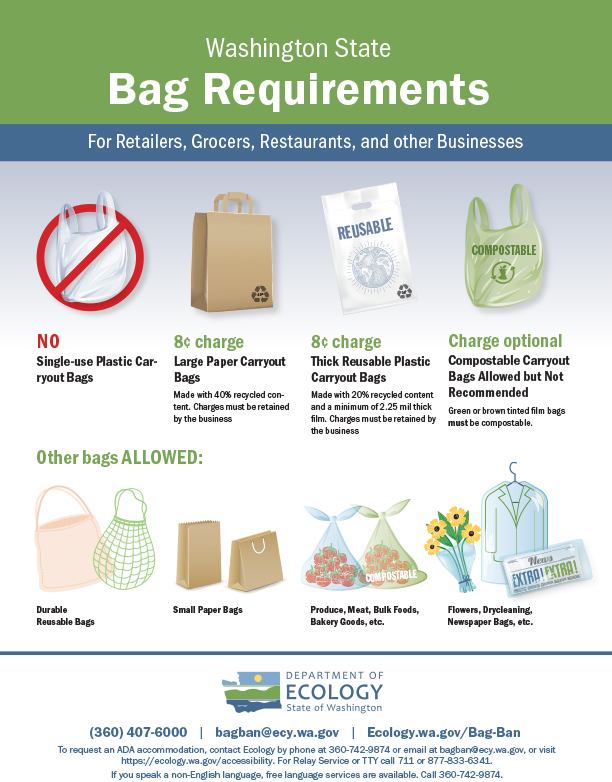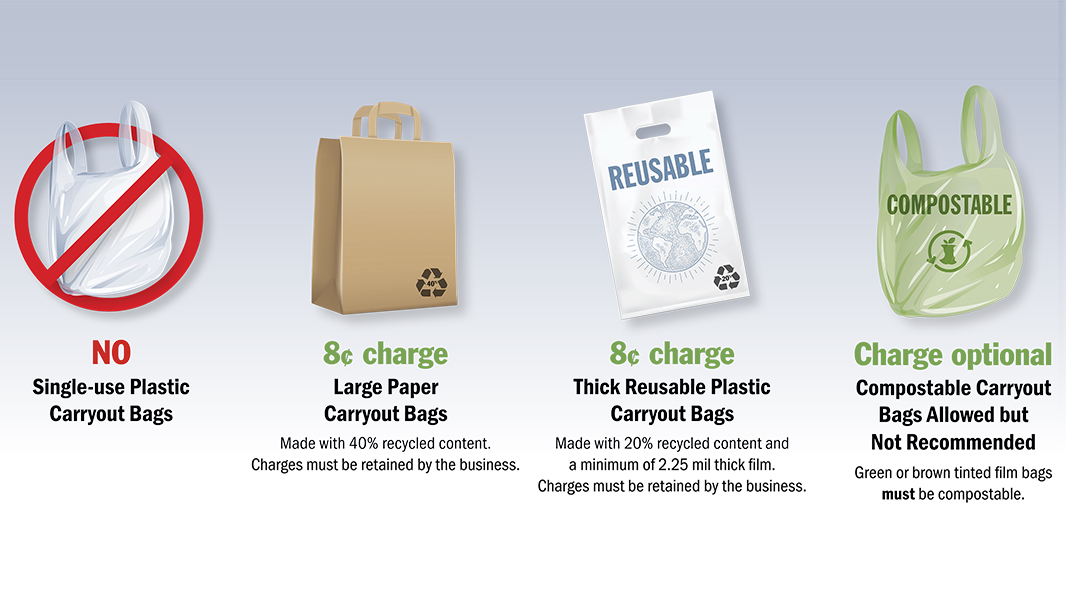During the 2020 legislative session, the Washington State Legislature passed a statewide ban on single-use plastic bags to reduce plastic pollution, litter, and waste — and to reduce contamination in recycling and composting systems and build consistency in policy and enforcement across the state. Gov. Jay Inslee delayed implementation of the bag ban from the original effective date of January 1, 2021 until October 1, 2021 due to supply chain issues related to sourcing compliant bags during the COVID-19 pandemic.
 The ban covers any single-use plastic carryout bag provided at delivery, check stand, cash register, point of sale, or other point of departure to a customer. All retail, grocery, and convenience stores must comply, as well as any restaurant or establishment offering take-out or delivery food or goods, temporary stores or vendors, and any event where food or goods are sold or distributed. Allowed bags include: Paper bags made of at least 40% postconsumer recycled content or wheat straw (and labeled with the postconsumer recycled content); and Thick, reusable plastic bags (at least 2.25 mil) made of at least 20% postconsumer recycled content that are labeled “Reusable” and have the mil thickness and postconsumer recycled content percentage printed on the bag. Compostable film bags for products used by customers in stores before checkout must meet the requirements for compostable products and film bags in Chapter 70A.455 RCW. Establishments can offer green or brown compostable shopping bags, but the Washington State Department of Ecology (WADOE) discourages their use due to the small number of composting facilities in the state that accept them.
The ban covers any single-use plastic carryout bag provided at delivery, check stand, cash register, point of sale, or other point of departure to a customer. All retail, grocery, and convenience stores must comply, as well as any restaurant or establishment offering take-out or delivery food or goods, temporary stores or vendors, and any event where food or goods are sold or distributed. Allowed bags include: Paper bags made of at least 40% postconsumer recycled content or wheat straw (and labeled with the postconsumer recycled content); and Thick, reusable plastic bags (at least 2.25 mil) made of at least 20% postconsumer recycled content that are labeled “Reusable” and have the mil thickness and postconsumer recycled content percentage printed on the bag. Compostable film bags for products used by customers in stores before checkout must meet the requirements for compostable products and film bags in Chapter 70A.455 RCW. Establishments can offer green or brown compostable shopping bags, but the Washington State Department of Ecology (WADOE) discourages their use due to the small number of composting facilities in the state that accept them.
The law set fees for acceptable bags that stores can charge consumers. Fees are 8 cents for large paper carryout bags and 8 cents for thick reusable plastic carryout bags. Businesses collect and keep the entire 8 cents to recover some of the cost of providing the bags, and to incentivize customers to bring their own reusable bags. The WADOE website lists a number of single-use bags that are still acceptable, including those used by consumers inside stores, e.g., for purchase of bulk items, produce, meat, fish, flowers, etc. Other exempt bags include newspaper bags, mailing pouches, door hanger and dry cleaning bags, and bags sold in packages with multiple bags, like food storage, garbage, or pet waste.
To assist with the transition away from single-use plastic bags, the WADOE is providing technical assistance, education, and outreach materials to businesses and the public — including a bag ban outreach toolkit that is formatted for accessibility and available in 17 languages.










